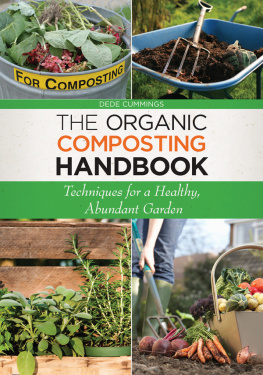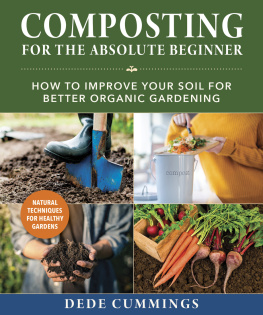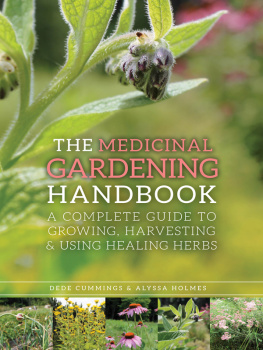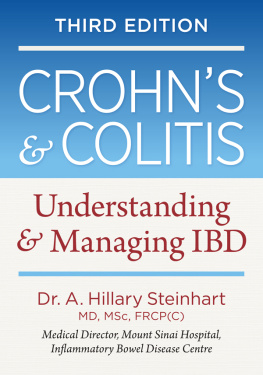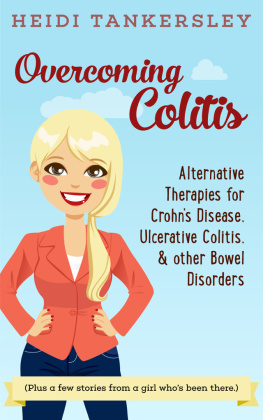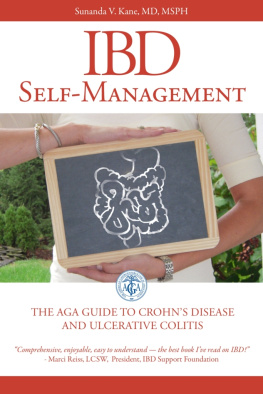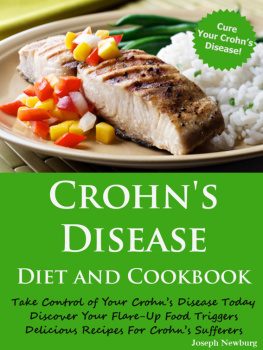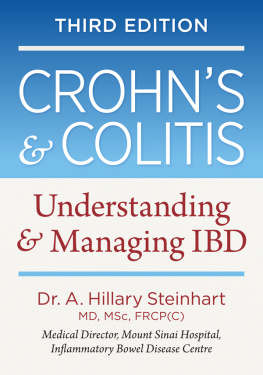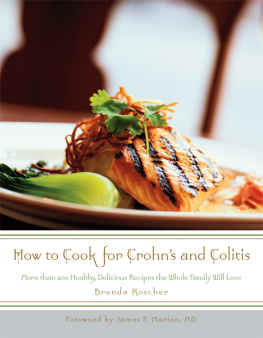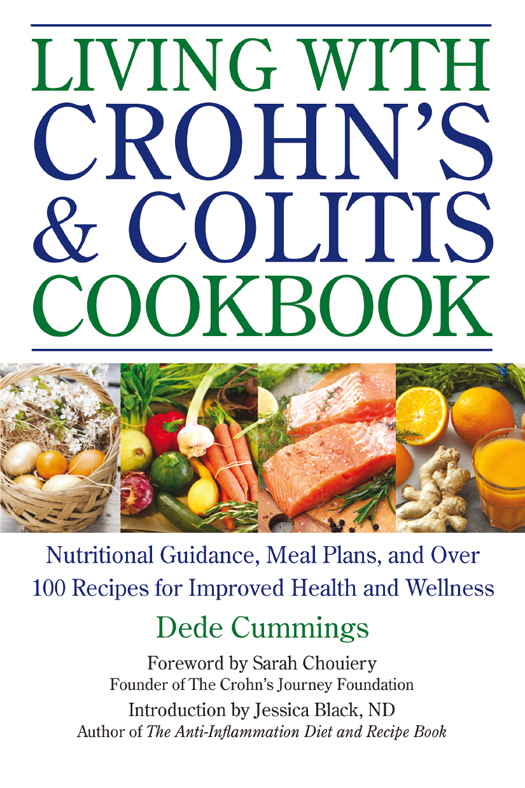Hatherleigh Press is committed to preserving and protecting the natural resources of the earth. Environmentally responsible and sustainable practices are embraced within the companys mission statement.
Visit us at www.hatherleighpress.com and register online for free offers, discounts, special events, and more.
Library of Congress Cataloging-in-Publication Data is available upon request.
ISBN: 978-1-57826-510-7
eBook ISBN 978-1-57826-511-4
All rights reserved. No part of this book may be reproduced, stored in a retrieval system, or transmitted, in any form or by any means, electronic or otherwise, without written permission from the publisher.
CONTENTS


FOREWORD
L iving with Crohns and Colitis Cookbook is a great first step for anyone with inflammatory bowel disease (IBD) who would like to explore a change in their diet and nutrition to better their health. This cookbook, written by Dede Cummings, a fellow Crohns patient, features tips on living a more holistic lifestyle by looking at the person as a whole and learning how to deal with all aspects of their condition. It is filled with practical, accessible, and up-to-date knowledge that will assist someone with IBD in exploring alternative ways to achieve their health goals.
Everyone with IBD is different; this is what makes us unique and a bit challenging. We are responsible for finding what works for each of us. We must educate, explore and implement what is given to us and make it our own. What may work for one person with IBD may not work for another.
Being a Crohnie myself, I know it can be daunting when first trying to navigate your diet and nutrition, which is why I support this book and was honored to contribute to it. One of the first books that helped me find alternative methods to treat my Crohns was written by Dede. That book, Living with Crohns & Colitis: A Comprehensive Naturopathic Guide for Complete Digestive Wellness, co-authored by Dedes naturopath, Jessica Black, ND, opened my eyes to a world I did not know existed.
I understand how overwhelming it may seem when first diagnosed with Crohns disease or ulcerative colitis. I know this from my own experiences as well as from the many stories I have heard through my foundation, The Crohns Journey Foundation. Every day I hear at least one new story of someone taken aback and confused by a diagnosis they had never heard of before. When I was first diagnosed with Crohns disease, I did not take it seriously. It was not until September 2012, when I was hospitalized and felt like I could not survive another day, that I really accepted that this was a serious disease. I wanted guidance on how to help myself get better and realized in order to do this, I had to look beyond western medicine. Looking back at that time, armed with the knowledge I now have, I see the necessity of a whole mind, body approach..
After reaching out to Dede, I continued my research and began to reach out to other holistic and alternative practitioners and advocates. I pursued my foundation and made it a mission to teach others who were also struggling with Crohns and IBD that there are other options besides medicationit is a whole soul, body, and mind approach. I wanted to emphasize that yes, diet does matter.
I am very passionate about holistic approaches to IBD, and that is why I feel this book is needed. Remember; take what you find in here as an outline to achieving your health goals. This book should be a road map where you fill in the blanks and figure out what works for you and what doesnt. I hope this will inspire you, as it has me.
Sending love to all your bellies,
S ARAH C HOUEIRY
Founder, The Crohns Journey Foundation
INTRODUCTION
T O LEAD A HEALTHY LIFESTYLE , we must consider our relationship with food to be a vital part of survival. If we exist because of the nutrients we consume, our health is reflected by what we eat on a daily basis. There are many important aspects to consider when fueling the body. In current society, our understanding of food for survival and health has declined over generations. Processing and handling has changed our relationship with food and has even altered our taste for food. We have become accustomed to the buttery, rich, sweet flavors of processed foods and the more we eat these types of foods, the more we crave them. Our hunger becomes insatiable when we eat processed, unnatural foods. Obesity and weight gain plague our population, thus contributing to many chronic illnesses. If only the way we ate gave our bodies a better sense of satiety, we could feed our bodies without overeating.
Many generations prior, individuals had to hunt and gather to obtain food. In addition, the food they ate was of utmost freshness and was extremely nutrient-dense, without the added calories, sugar, and fat contained in the foods we eat today.
Earlier generations also experienced stress very differently from the stress we face today. Years ago, stressors were consistently related to survival and were often met with physical demands. In this sense, stress was important because it provided individuals the chemicals needed to move to a safer location or run after their hunt. Due to our present-day sedentary habits and because stress is consistently related to symptoms and flare-ups of digestive disorders, finding ways to reduce stress is essential to digestion and long-term wellness for all sufferers.
Earlier in history, when we had to hunt or grow our own food, we appreciated its worth and its gift to us as life-giving power. We were mindful as we shared this food together with our families. It is my assumption that if we once again had to roam, hunt, and gather to obtain food, our culture would be much more appreciative of the food we consume and we would take the time to appreciate the eating process. We can learn something important from indigenous cultures; to honor and cherish the earth for producing our food and allowing us to be nourished. A simple prayer or reflection before meals can change the intent during a family meal. Concentrate on keeping calm, chew your food slowly, and pay attention to the food you are eating. Taking the time to do this during family meals can change how you digest.
It is presumptuous to assume that we can return to those times of hunting and gathering. However, as a society, we can make large efforts to pay more attention to our eating and lifestyle habits. Lifestyle habits can make the difference between disease and wellness. From food choices, exercise, and meal-time habits to meditation and giving thanks, we can make differences in our health, no matter what plagues us.
Serendipitywhen two people meet on the street and know they were meant to be there at that precise time in order to meet each other. To know that coming together for them meant something so much more than the sideward glance they shared before enlightenment. In many ways, I feel that my meeting Dede Cummings has been serendipitous.


